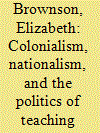| Srl | Item |
| 1 |
ID:
132970


|
|
|
|
|
| Publication |
2014.
|
| Summary/Abstract |
For Palestinian nationalists in Mandate Palestine, British education policy was a source of constant frustration. The shortage of schools, the lack of local control over the curriculum, and the marginalization and de-politicization of Palestinian history constituted major grievances. Proceedings from the Peel Commission reveal much about the rationale behind this policy, particularly the bias toward "rural" education and the attempts to control teachers. Drawing on and complementing the work of A.L. Tibawi, this article seeks to shed light on the nationalists' protests by examining both the responses of officials brought before the Commission, as well as the government's history curriculum during the Mandate. In doing so, the research shows that education policy was constructed to maintain the underdevelopment of Palestine and to hinder state-building efforts that could compete with those of the Zionists.
|
|
|
|
|
|
|
|
|
|
|
|
|
|
|
|
| 2 |
ID:
163845


|
|
|
|
|
| Summary/Abstract |
Ruins typically mark the endpoint of historical stories, regarded as objects worthy of attention only for the bygone times they represent. But what might a history reveal if it took ruins as its departure point? How would a history of ruins look? This article aims to write ruins into history by pondering the case of Gaza in the aftermath of World War I. The ruins of the city, it is argued here, were the site of a transformation in the modalities of urban change: what had been a ubiquitous and organic process of evolution in the cityscapes of the Middle East up to the late nineteenth century was replaced by top-down spatial convention, imposed by the modern state. This transformation deprived ruins from their long-standing role as essential elements of the urban landscape and flattened them into mere emblems of cultural decay. Consistent with the ontological stance of the progress/decline binary, by the early twentieth century, spatial ruination had become regarded as a unidirectional rather than multidirectional process. This modern framing of ruins proved especially significant for postwar Gaza, whose reconstruction efforts were consequently plagued by internal contradiction.
|
|
|
|
|
|
|
|
|
|
|
|
|
|
|
|